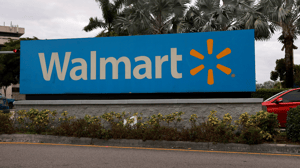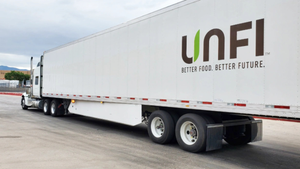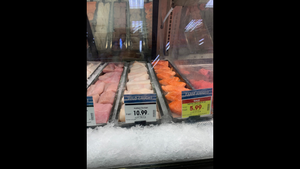Grocery's Biggest Players Seek to Reassure on Holiday Supply Chains
There are only so many supply-chain levers retailers can pull. As retailers detail the steps they're taking to meet holiday demand, the not-so-subtle message is: Shop early.

Some of grocery retail's biggest players are looking to reassure customers (and investors) that they're ready for the coming holiday shopping crush, whatever they've heard about global supply-chain disruptions...while also encouraging shoppers to start checking off their lists early, just to be safe.
Bentonville, Ark.-based Walmart, in a recent corporate blog post, listed 10 actions it is taking to navigate supply-chain disruption heading into the 2021 holiday season. Among these: hiring 3,000 new drivers in the past year, adding 20,000 supply-chain positions and rerouting inland shipments using "less conventional transportation methods" to bypass crowded rail lines.
"We’ve been delivering the holidays for over 50 years," U.S. EVP of Supply Chain Joe Metzger wrote. "Customers can rest assured we’re doing everything we can to deliver a holiday experience they’ve come to expect." And while "we’d like to see inventory levels continue to improve," he acknowledged, "we’re on the right track."
Target, too, recently struck a reassuring note. The Minneapolis-based retailer, which is wrapping up its in-store and online Deal Days event (Oct. 10-12), noted at the beginning of September that it had stocked up earlier and fast-tracked orders from vendors where it could.
"Bottom line," the retailer said, "we’re ready for our best season yet, and this holiday and beyond, you can count on Target for the joy and inspiration you need for all life’s special moments." Last week, Target announced two new "buy now, pay later" options and launched a holiday price-match offer that runs Oct. 10 through Dec. 24. "As we (and countless industries across the globe) continue to navigate unprecedented supply chain challenges," Target stated last month, "we’re thinking outside the box to ensure we’re ready with the safe, joyful shopping experience you expect during the busiest season of the year."
What U.S. consumers have come to expect, however, has changed since pre-pandemic times, and heightened expectations for hyperspeedy delivery and always-somewhere-nearby availability are running up against bottlenecks—many outside retailers' control, despite their best efforts—throughout the supply chain.
Consumer demand for CPG products climbed 9.4% in August, the Arlington, Va.-based Consumer Brands Association noted last week, and shows "no signs of slowing." Retailers have been looking forward to a robust appetite for holiday shopping as consumers embrace more in-person holiday gatherings this year after the ongoing COVID-19 pandemic put a damper on many seasonal celebrations, from "Friendsgivings" to New Year's Eve parties, in 2020.
Target Corp. Chief Growth Officer Christina Hennington said in the company's most recent earnings call in August that customers are "hungry to celebrate key holidays." Consumers, she said, "have healthy balance sheets and remain eager to find safe ways to connect with their loved ones."
With an emphasis on at-home celebrations, that includes splurging on everything from food and drink to holiday decor—a trend already playing out in consumers' Halloween spending. The National Retail Federation predicts that Halloween spending in the U.S. will reach an all-time high of more than $10 billion this year, up from just over $8 billion in 2020, with spending on decorations projected to spike from $2.65 billion in 2019 to $3.17 billion this year and candy sales to reach $3 billion after hovering around $2.6 billion from 2017 through 2019.
But consumers still aren't necessarily finding the selection they expect when they go to purchase online or in-store, and that's likely to extend through the holidays. Reuters reported Tuesday that a senior White House official had acknowledged, "There will be things that people can't get," when they're doing their holiday shopping. "We all feel the frustration and there's a certain need for patience to help get through a relatively short period of time," the unnamed official told Reuters reporters.
Labor issues tied to or exacerbated by the pandemic are largely to blame, argues Consumer Brands CEO Geoff Freeman. The CPG industry has 143,000 unfilled jobs, Consumer Brands said in a statement following the release of Friday's weaker-than-expected September jobs report from the Bureau of Labor Statistics, so the availability of products made stateside is threatened because food processors and other manufacturers are facing staffing challenges.
See also: Consumer Brands CEO: 'This Is An Emergency Situation; It's Time to Treat It As Such'
"We have run out of slack in the system," Freeman said in the statement. "The imbalance of jobs added versus jobs open is driving up costs and threatening product availability. As we head into the busy holiday season, we need to find ways to grow the workforce to keep shelves stocked with essential goods." (Preserving essential goods' availability amid continued supply-chain disruption prompted Costco CFO Richard Galanti to announce last month the return of purchase limits on some high-demand products, including toilet paper, paper towels, some cleaning products and Kirkland Signature water.) Consumer Brands has called on government leaders to take a variety of steps, from enhancing childcare and family-support programs to help more individuals return to the labor force to updating trucking regulations, to help ease U.S.-based suppliers' and retailers' labor woes.
Meanwhile, in looking at the imports picture, products traveling by sea from China and other Asian manufacturing hubs have faced delays on both sides of the Pacific in part because of COVID quarantines and other labor shortages at ports. On Sept. 17, the ports at Los Angeles and Long Beach had a record 62 ships waiting to dock and unload, American Public Media's "Marketplace" reported.
Walmart, along with Target and Costco in the food-retail space, are trying to (literally) get around some import issues by chartering their own vessels. Walmart's Metzger said that Walmart is diverting its chartered ships to less-congested ports; Costco's Galanti noted in the company's fourth-quarter earnings call in September that Costco had chartered three ships for the next year and leased several thousand containers for use on them, with supply-chain delays expected to last into 2022. Target, which counts itself as the second-largest U.S. importer, said that in addition to steering clear of backed-up ports and avoiding extra stops via the use of the retailer's one chartered vessel, it is "partnering closely with our vendors and transportation partners to move [product] quickly to our stores" once items arrive in the U.S.
Walmart, Target and Cincinnati-based Kroger also all have announced plans in recent weeks to hire tens of thousands of new workers heading into, but not exclusively for, the holiday season. "It’s an exciting time to work in grocery retail," Kroger Chief People Officer Tim Massa said in a news release about the grocer's Oct. 13 hybrid hiring event, which seeks to fill 20,000 positions.
Big end-of-year hiring announcements are as par for the holiday retail course as customer complaints about out-of-stock video-game consoles, of course. But the reassurances to customers about across-the-board inventory management—not just stock levels of hot-ticket toys or perennial grocery favorites—is a 2021 twist. And they serve as an open acknowledgement that yes, supply-chain issues are very real heading into this holiday season—and consumers who haven't started their holiday planning would do well to get a move on.
About the Author
You May Also Like






